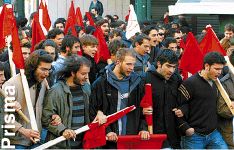 |
||
|
Academics strike back
|
||
|
By Kathy Tzillivakis |
 Students demonstrate against reform on January 31 |
|
UNIVERSITY teachers stepped into the spotlight on February 1 to call for the reopening of universities and present a series of reform proposals rival to those of the government. A group claiming to represent more than 1,000 professors from across the country met with Education Minister Marietta Yannakou to discuss the government's plans to overhaul higher education. They presented Yannakou with a list of their own proposals. "We do not represent any particular political interests and we do not have a hidden agenda," Costas Sofoulis, a professor at the University of the Aegean, told a press conference in Athens. "We [the 1,000 professors] have come together because we care about public university education... [which] is on the verge of falling apart and it does not deserve such a fate." The university system has been in a state of turmoil since June last year, when students, supported by teacher unions and leftwing parties, took to the streets to oppose a series of academic and administrative reforms. The new, rival proposals place autonomy in the disbursement of funds and academic decisions at the top of the agenda. State officials argue that public universities cannot become self-governing institutions while they are entirely taxpayer-funded. Athens University Professor Antonis Liakos blamed the government for the unrest. "During our meeting with the minister today, I stressed that the government is responsible because it started without any plan," he said. "We put across our own proposals." According to Liakos, the academics are calling on the government to delineate exactly how it intends to amend article 16 of the constitution, which is currently interpreted as excluding anyone but the state from the business of higher education. They want the socialist opposition, Pasok, to do the same. The 1,000-odd professors want Yannakou to embody their proposals into the draft legislation that her ministry is currently hammering out (see article below). "We want the ministry to take our proposals as a base," said Liakos. "We also want [the government] to commit funding for the universities." "I stressed to the minister that we are amidst a crisis," said Lefteris Papayannakis, professor at the Athens Polytechnic. "A closed university, is a dead university." Minister at work According to Yannakou, her ministry is currently "putting the finishing touches" to the proposed university education overhaul and will take the professors' proposals into "serious consideration". The proposed reforms will reportedly be tabled before May. Athens University Professor Thanos Veremis, chairman of the National Education Council (ESYP) that drew up the proposals, has threatened to resign if the government doesn't meet that deadline. "I wish to thank them for all their proposals," Yannakou told reporters after her three-hour meeting with the professors. "[My] door is always open. We are here and we will listen to all proposals... The ministry is pleased that it has managed, through this dialogue, to bring together the views of so many professors." Yannakou is to discuss the proposals at a meeting of the council of Greek university rectors on February 3-4. Veremis says the initiative is welcome. "I think that this initiative is valuable because, despite the differences in the details, all these people agree that reform is absolutely necessary, as opposed to POSDEP [Hellenic Federation of University Teachers' Association] and the students - the political parties in the university, who think that we don't need to do anything," Veremis told this newspaper. "[The professors] used to be the silent majority. Now the silent majority has ceased to be silent. They have a voice and they are being heard." Veremis played down the differences between the ESYP proposals and the new ones. "Everyone agrees on the principles. It's a very good sign. Things are looking up." ESYP unveiled its proposals in April 2006, amid strong reactions from academics and students. The measures included limits on the numbers of years allowed for the completion of undergraduate degrees and changes to the asylum law, which bans police from entering university grounds. Many of ESYP's reforms were adopted by the government, but some were softened. |
||
Rallying against reforms Not all university professors agree that higher education should be overhauled. They joined several thousand students and marched to the parliament building in downtown Athens on January 31 to protest against the government's plans to overhaul public university education and to revise the constitution to legalise private universities. A similar protest was held in Thessaloniki, northern Greece. |
 Education Minister Marietta Yannakou on February 1 meets with a group of academics who say they represent more than 1,000 professors nationwide to discuss university education reform |
|
| POSDEP, which staged a three-day strike last week, threatened to continue with rolling strikes. Public secondary school teachers have also threatened to hold work stoppages in sympathy. The proposals backed by more than 1,000 professors nationwide * Universities should be allowed to draft their own internal rules and regulations (if they haven't done so already) * The election of administrative bodies (rectors, vice-rectors, department heads) should be based on universal suffrage. Everyone (professors, students, administrative staff etc) should vote, but voting powers should be proportionate and based on turnout * The current system of professors assigning only one course textbook should be gradually eliminated and university libraries should be improved. Each department should have a special fund for textbooks. There should also be greater use of electronic sources like the internet Financial affairs * Universities should publish their own financial reports/statements * Each university shall submit a four-year financial plan and strategic development plan * Universities should be exempt from paying taxes, and donations to universities should be tax-deductible Professors * Election of professors: the selection process should be undertaken by each department and should also involve one or more external judges * Faculty should be ranked into a) part-time, b) full-time and c) full-time and exclusive employment, or they should be ranked into a) part-time and b) full-time and exclusive employment * Mobility: professors should be allowed to spend between six months and one year instructing or conducting research at other universities Students * Financial support: extend scholarships to more students and offer students part-time employment on campus * Perpetual students: each university should be allowed to decide how long their students may spend earning a degree * New student services: establish academic advisors * Create new academic programmes and allow students enrolled in one programme/department to take classes in another. Universities should also be allowed to hold classes in a language other than Greek Relationship with the state * The number of new enrolments each year should be based on each university's four-year strategic development plan * Asylum: the rector's council should vote by an increased majority whether or not to allow police to enter the university grounds * Each university should establish its own ombudsman or some kind of independent body to mediate between the university and the education ministry * Internal and external assessment of teaching, research and administrative affairs. The external assessment should be undertaken by independent bodies |
||
Why amending article 16 can be good for public universities |
||
|
THE DEMISE of the public university education system can only be prevented if article 16 of the Greek constitution is amended, according to a leading constitutional expert. Nikos Alivizatos told an Athens conference organised by the Hellenic Foundation of European and Foreign Policy (ELIAMEP) on January 31 that the revision of article 16, which is interpreted as prohibiting the establishment of private universities in Greece, should be viewed as an opportunity to improve public universities and to keep up with the changes through time. According to Alivizatos, article 16 should explicitly state that higher education shall be offered by both public and private institutions and that their particular status should be outlined in separate legislation. He also said that article 16 should be revised in order to allow these institutions to be self-governed by having them establish a special managing body. "The philosophy behind this is to liberate the lawmaker," said Alivizatos, criticising the current version of article 16 for permitting too much state meddling in university affairs. "We need to foresee many different types of universities, public and non-public... with such a measure we can foresee other types of institutions, including the branches of foreign universities and those [private] universities that will come." "But what's most important in my view is that it will provide autonomy for the public university," he added. "Self-government will be possible with the body that they will establish." Alivizatos stressed that it is time to turn the tables. "Today, public universities can do by themselves only what the law says they can do," he said. "What I am proposing is for the university to do everything that the law does not save for itself." |
||
|
|
||
(Posting Date 8 February 2007 ) HCS readers can view other excellent articles by this writer in the News & Issues and other sections of our extensive, permanent archives at the URL http://www.helleniccomserve.com./contents.html
All articles of Athens News appearing on HCS have been reprinted with permission. |
||
|
||
|
2000 © Hellenic Communication Service, L.L.C. All Rights Reserved. http://www.HellenicComServe.com |
||

